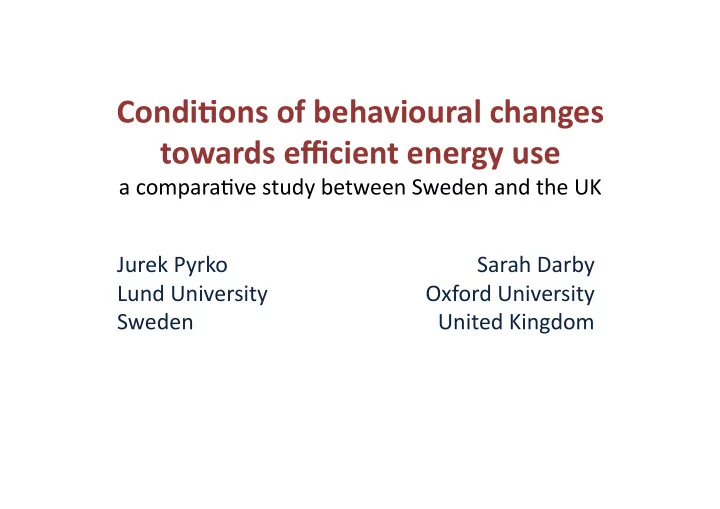

Condi&ons of behavioural changes towards efficient energy use a compara(ve study between Sweden and the UK Jurek Pyrko Sarah Darby Lund University Oxford University Sweden United Kingdom
Kingdom of Sweden United Kingdom • Popula(on 9.2 million • Popula(on 61.6 million • Area 450,000 km 2 • Area 244,820 km 2 • Cons(tu(onal monarchy • Cons(tu(onal monarchy • Member of the EU (1995) • Member of the EU (1973) • GDP per capita 52,789 USD • GDP per capita 43,785 USD • Currency: Swedish krona • Currency: Pound sterling • Traffic: right • Traffic: leX
To compare: how specific condi(ons in the UK and Sweden can s(mulate or aZempt to compel householders to be more energy efficient, or can obstruct this
described and compared in this paper: 1. Climate change policy 2. Electricity and gas use 3. Role of u(li(es and other ‘external’ agents in residen(al demand reduc(on 6. Regula(on 7. Quality of feedback on energy use to the householder 8. Customer behaviour
2006 Swedish Parliament: Budget for 2020 must be 26%+ 20 % lower energy use in lower than 1990 residen&al/ter&ary 2020, 2008 Climate Change Act: net and 50 % 2050 carbon account for 2050 8 % emission reduc&on has to be at least 80% (Kyoto +4 %) lower than 1990 baseline Dependence on fossil fuels in Expert commiKee sets 5‐year dwellings should be broken carbon budgets by 2020
Residen&al sector = 32 % of Delivered energy/home/ yr = • • total energy use (124 TWh) 20MWh; fall of approx 11 %, 2000‐2007 Electric space hea&ng/hot • water 60 % of electricity Gas accounts for 70 % of delivered • demand energy to homes Lower electricity use a_er 2000 • 60 % of delivered home energy is • for space hea&ng 21 MWh /year/household • Gas and coal dominate electricity • Natural gas 0.4 TWh • supply mix; nuclear 15 %, Supply mix – 45 % hydro, 44 % • renewable 5 % nuclear, 8 % renewables, 3 % others (fossils)
90 % from 4 suppliers 90% of sales from 6 suppliers • • Electricity price = 40 % electricity, ’confusion marke&ng’ of tariffs • • 20 % network fee, 40 % taxes Cost of fuel+profit = 69% of cost • to customer and cer&ficates Standing charge depends on fuse • Most prepayment users pay high • level (10, 16, 20, 25 A) unit costs, (not in N Ireland, Law on compulsory monthly • where 25% are electricity pp readings from 1 July 2009 customers) Tariffs are fixed‐rate or declining • block – no incen&ve to stay below threshold level
Lower energy prices AND energy • Carbon Emissions Reduc&on • conserva&on AND social equity Target makes suppliers into No fee or tax intended to • agents of climate change policy: support EE they must spend on efficiency +renewables, credited with Green cer&ficates electricity • savings from renewable sources Also local authori&es, • U&li&es offer EE services • construc&on industry, educa&on +business, NGOs ...more trusted than u&li&es?
Electricity cer&ficates 2003 In process of implemen&ng • • increase RES by 17 TWh between EPBD... 2003‐2017 Government funds efficiency • Energy Declara&ons for all • programmes for vulnerable buildings 2008 – efficient energy households use and good indoor comfort [erra&c] grants for renewable • Renova&on grants: ‘ROT’ • technologies through low‐carbon buildings programme Conversion grants: el other • Network of energy advice • Grants : PV, biofuel fired hea&ng • centres
Compulsory monthly readings Direct debit most common • • star&ng July 2009 payment method Informa&ve bills: Es&mated bills s&ll common • • recommenda&on – 13 months Smart meter rollout planned, • graphs on bills including customer feedback – Pilot trials with energy use • trials under way feedback: Niche suppliers star&ng to offer • Internet and home displays feedback
• Good and unlimited energy • Energy and power not yet supply = ‘ci&zen right” within ’natural language of mainstream householders’ • Awareness: seniors more aware and frugal; house • Increasing awareness of gas owners usually more aware and el use as ‘pollu&ng’ than tenants • Average indoor temps rose • Trials on ‘cri&cal peak by 6°C since 1970; pricing’ – 50 % lower load ‘aptudes’ o_en don’t match behaviour • Expecta&on that ‘someone does something’
Thank you for your aZen(on… Sarah.Darby@ouce.ox.ac.uk Jurek.Pyrko@energy.lth.se
Recommend
More recommend